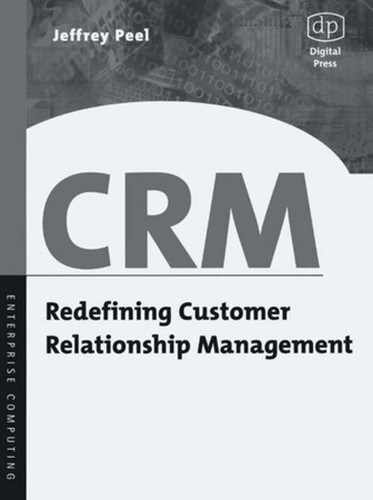
10.3 The brand and CRM 157
10.3
For effective CRM, brand equity operates at the micro level. Each and
every consumer will have his or her own brand equity rating, and that brand
equity rating will vary almost day to day. If CRM systems are to work at any
level, they need to work at the microlevel in terms of assessing each and every
customer's brand equity.
One of the most highly regarded research practitioners on the subject of
brand and brand equity is Rory Morgan of Research International, one of the
world's largest custom market research firms. He approaches brand manage-
ment from the traditional perspective and puts the importance of brand
measurement as follows:
If brands are a company's most valuable and enduring asset, it is vital
for marketers to know exactly what they have got, and [it is] surpris-
ing how few have a really clear idea of what makes their brands tick.
Which is where the right research comes in. Only by understanding
how the various components of branding~such as emotional affin-
ity, functional performance, service satisfaction, brand equity, value
for money, and so on--fit together, can a brand be well managed.
Just imagine how effective an organization could be if it were able to assess
brand performance both at this aggregate level and at a customer-specific
microlevel. And I would bet that most managers who have been given respon-
sibility for CRM never thought they might end up with brand management
responsibilities!
The brand and C RM
Let's look at the key components of brand measurement that Research Inter-
national offers and then discuss how practical it might be to integrate such
measures into CRM processes.
Gaining a qualitative understanding of how customers engage and their
perceptions of the brand can be incredibly powerful. For managers, technical
and nontechnical, who have been charged with implementing CRM
processes, it can be revelatory. The challenge lies in being able to define the
brand. Certain financial services companies have many, many brands, divi-
sions, and persona. Some customers will have relationships with all, others
with just some.
However, in order to define appropriate CRM processes, brands need to
be defined on the basis of customer engagement. Wholly defined units with
which the customer engages (regardless of the internal structures required to
I Chapter 10

158 10.3 The brand and CRM
i
I
present this unit) should be assessed individually. Therefore, it is pointless for
a highly diversified organization with many dozen subbrands to attempt to
assess the nature of brand equity at the parent level. Such work may be inter-
esting in terms of assessing the efficacy of marketing communications activity
but is of little use for CRM process definition.
Qualitative research, based on one-on-one interviews or focus groups,
attempts to determine the characteristics of the brand that make it preferred
over other brands. By conducting research among customers and noncus-
tomers, the degree of brand involvement, the potential longevity of the rela-
tionships, and the factors contributing to longevity, can all be assessed.
Factors contributing to longevity of brand relationship are not quite the
same as factors that contribute to lifetime customer value. Sometimes it is the
case that customers might perceive that they are likely to engage with a brand
for a very long time indeed, but the relationship is of very limited value. For
example, I may always buy a Volkswagen and love the brand, but I won't
change my car for 15 years and won't get it serviced by a Volkswagen dealer
after the warranty expires. Therefore, qualitative research should attempt to
identify the factors that contribute to brand preference as well as the factors
that contribute to long-term, actual, and profitable brand engagement.
Building on qualitative work of this nature, quantitative research can
allow CRM practitioners to understand the relative weights of factors or
attributes of brand that contribute to overall brand preference and (profitable)
brand adherence.
Such research is very useful indeed for benchmarking against competitors
or organizations perceived as best of class in a particular category. However,
other research techniques provide potentially more useful pointers for CRM
practitioners who may be considering building brand equity monitors into
standard CRM processes.
Again, referring to Research International's roster of brand diagnostic
tools may provide some food for thought (the reader should be aware that
there are many other survey firms that offer variations on the same theme).
This is how Morgan describes Research International's Equity Engine: t
Equity Engine brings together the critical factors that determine the over-
all equity of the product or service in the consumer's eyes. It demonstrates the
emotional characteristics of the branding (as measured by the affinity it gener-
I. Equity Engine is a Service Mark of Research International Ltd.
..................Content has been hidden....................
You can't read the all page of ebook, please click here login for view all page.
